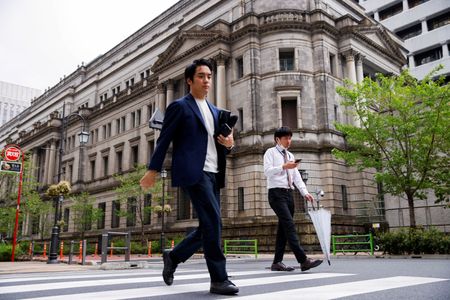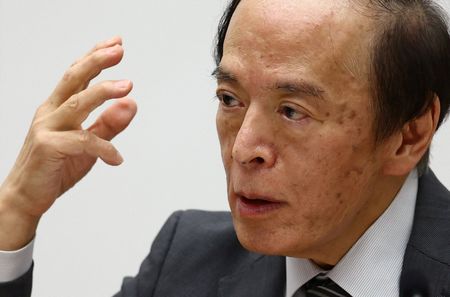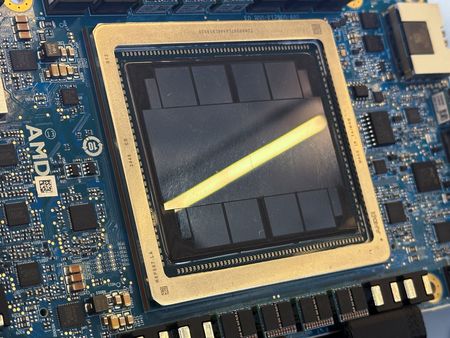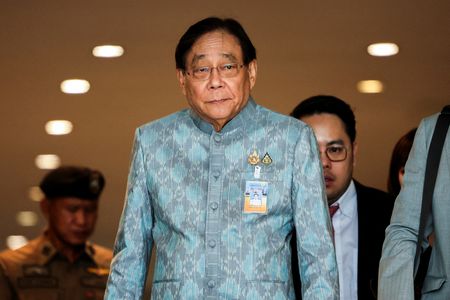By Leika Kihara
TOKYO (Reuters) -Japan’s central bank may face political pressure to keep interest rates low for longer than it wants, as opposition parties favouring tax cuts and loose monetary policy are expected to gain influence after a July 20 election.
Opinion surveys suggest Prime Minister Shigeru Ishiba’s coalition may lose its majority in the upper house of parliament, forcing it to court an array of smaller parties pushing for easier fiscal and monetary policy.
The governing bloc led by Ishiba’s Liberal Democratic Party is already a minority in the more powerful lower house, so a stalemate in both chambers could give opposition parties outsized influence in policy decisions.
Ishiba has supported the Bank of Japan’s policy of gradually lifting interest rates from near zero as inflation picks up in the world’s fourth-biggest economy, while trying to curb the biggest government debt burden in the industrial world.
But if opposition groups gain traction with their pressure on the BOJ to avoid rate hikes and for the government to cut the sales tax, that could boost bond yields and complicate the bank’s efforts to normalise monetary policy, some analysts say.
The BOJ declined to comment on the potential impact of the election on monetary policy.
“There’s a 50% chance the ruling coalition could lose its majority in the upper house, which could lead to increased debate about cutting Japan’s consumption tax rate,” said Daiju Aoki, chief Japan economist at UBS SuMi Trust Wealth Management.
“That would push up Japan’s long-term interest rates by stoking concern over the country’s finances,” he said.
DEBT SET TO RISE
Sohei Kamiya, head of the upstart right-wing party Sanseito, has criticised the BOJ for slowing its bond buying when the economy remains weak.
“The Ministry of Finance and BOJ should work hand in hand in taking aggressive steps for a few years to boost domestic demand,” Kamiya told a press conference this month.
Another small group, the Japan Innovation Party, wants the BOJ to go slow in raising rates to restrain the cost of interest on the government’s debt.
Yuichiro Tamaki, head of the Democratic Party for the People, a party seen as a strong candidate to join Ishiba’s coalition, has urged the BOJ to loosen, not tighten, monetary policy to keep the yen from rising and hurting the export-reliant economy.
Even if the coalition keeps its majority, Ishiba may need to ditch his hawkish fiscal tilt and boost spending to cushion the economic blow from threatened U.S.
tariffs and rising costs of living.
“There’s a good chance the government will compile an extra budget to fund another spending package to the tune of 5 to 10 trillion yen ($35 billion-$70 billion).
That would push up bond yields further,” said former BOJ board member Makoto Sakurai, who expects the central bank to avoid raising rates at least until March.
Japan’s public debt is equal to 250% of gross domestic product, far above that of Greece at 165%.
The government spends nearly a quarter of its budget to finance a 1,164-trillion-yen ($7.9-trillion) debt pile, with the cost expected to rise steadily as the BOJ exits zero-interest rates.
‘NEED TO BRACE’
To be sure, inflation – above the BOJ’s 2% target for three years – boosts nominal tax revenues, which can help the government avoid ramping up bond issuance to fund further spending.
But cutting the sales tax rate, an idea Ishiba has ruled out for now, would leave a bigger hole in Japan’s finances.
Once a fringe idea, cutting the 10% sales tax is now among Japan’s most popular economic policy proposals.
In a recent poll by the Asahi newspaper 68% of voters thought a sales tax cut was the best way to cushion the blow from rising living costs, compared with 18% who preferred cash payouts.
If the sales tax is on the chopping block after the election, it is the kind of vital issue that could prod Ishiba to dissolve the lower house and call a snap election – a move that would prolong political uncertainty.
If Ishiba were to step down, an LDP race to replace him could revive market attention to candidates like Sanae Takaichi, an advocate of aggressive monetary easing whom Ishiba narrowly beat in the party’s leadership race last year.
Unlike Ishiba, who gave a quiet nod to BOJ policy normalisation, Takaichi has said it would be “stupid” for the central bank to raise rates.
All this would mean the BOJ’s rate hikes, already on pause due to uncertainty over U.S.
tariffs, could be put on hold even longer.
“We may need to brace for a long period of political uncertainty and market volatility,” said Naomi Muguruma, chief bond strategist at Mitsubishi UFJ Morgan Stanley Securities.
“That would just give the BOJ another reason to sit on the sidelines and wait for the dust to settle.”
($1 = 146.8800 yen)
(Reporting by Leika Kihara; Editing by William Mallard)









